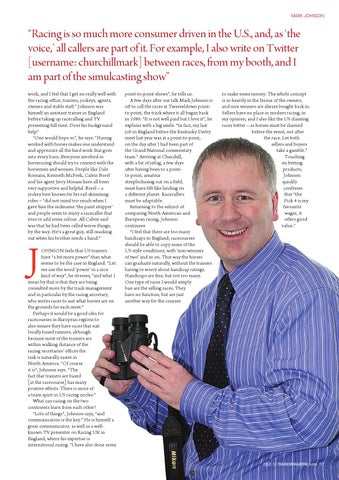JOHNSON ISSUE 30.qxd:Jerkins feature.qxd
20/5/10
18:05
Page 2
MARK JOHNSON
“Racing is so much more consumer driven in the U.S., and, as ‘the voice,’ all callers are part of it. For example, I also write on Twitter [username: churchillmark] between races, from my booth, and I am part of the simulcasting show” work, and I feel that I get on really well with the racing office, trainers, jockeys, agents, owners and stable staff.” Johnson was himself an assistant trainer in England before taking up racecalling and TV presenting full time. Does his background help? “One would hope so”, he says. “Having worked with horses makes one understand and appreciate all the hard work that goes into every barn. Everyone involved in horseracing should try to connect with the horsemen and women. People like Dale Romans, Kenneth McPeek, Calvin Borel and his agent Jerry Hissam have all been very supportive and helpful. Borel – a jockey best known for his rail-skimming rides – “did not mind too much when I gave him the nickname ‘the paint stripper’ and people seem to enjoy a racecaller that tries to add some colour. All Calvin said was that he had been called worse things, by the way. He’s a great guy, still mucking out when his brother needs a hand.”
J
OHNSON feels that US trainers have “a bit more power” than what seems to be the case in England. “Let me use the word ‘power’ in a nice kind of way”, he stresses, “and what I mean by that is that they are being consulted more by the track management and in particular by the racing secretary, who writes races to suit what horses are on the grounds for each meet.” Perhaps it would be a good idea for racecourses in European regions to also ensure they have races that suit locally based runners, although because most of the trainers are within walking distance of the racing secretaries’ offices the task is naturally easier in North America. “Of course it is”, Johnson says. “The fact that trainers are based [at the racecourse] has many positive effects. There is more of a team spirit in US racing circles.” What can racing on the two continents learn from each other? “Lots of things”, Johnson says, “and communication is the key.” He is himself a great communicator, as well as a wellknown TV presenter on Racing UK in England, where his expertise is international racing. “I have also done some
point-to-point shows”, he tells us. A few days after our talk Mark Johnson is off to call the races at Tweeseldown pointto-point, the track where it all began back in 1986. “It is not well paid but I love it”, he explains with a big smile. “In fact, my last job in England before the Kentucky Derby meet last year was at a point-to-point, on the day after I had been part of the Grand National commentary team.” Arriving at Churchill, with a bit of jetlag, a few days after having been to a pointto-point, amateur steeplechasing out on a field, must have felt like landing on a different planet. Racecallers must be adaptable. Returning to the subject of comparing North American and European racing, Johnson continues: “I feel that there are too many handicaps in England; racecourses should be able to copy some of the US style conditions, with ‘non-winners of two’ and so on. That way the horses can graduate naturally, without the trainers having to worry about handicap ratings. Handicaps are fine, but not too many. One type of races I would simply ban are the selling races. They have no function, but are just another way for the courses
to make some money. The whole concept is so heavily in the favour of the owners, and nice winners are always bought back in. Sellers have no place in modern racing, in my opinion, and I also like the US claiming races better – as horses must be claimed before the event, not after the race. Let both sellers and buyers take a gamble.” Touching on betting products, Johnson quickly confesses that “the Pick 4 is my favourite wager, it offers good value.”
ISSUE 30 TRAINERMAGAZINE.com 57
